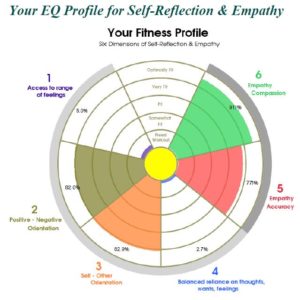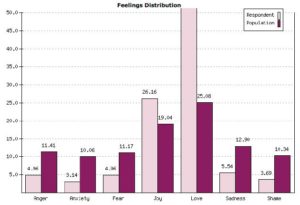by Sam, Management 3.0 Team
I’m going to kick off this article with something I like to refer to as the Aristotle Challenge. The philosopher said:
Anybody can become angry, that is easy. But to be angry with the right person and to the right degree and at the right time and for the right purpose and in the right way, that is not within everybody’s power and that is not easy.
The challenge that I present through Aristotle’s words is one of control. How can we not only get angry (which most of us can do fairly easily), but how can we learn to properly hone and direct our anger without letting it overtake us?
What Aristotle is talking about and the task I’m presenting is something we currently refer to as Emotional Intelligence (EQ). More companies are focusing less on expertise and more on that ‘je ne sais quoi’. The problem, however, is that until recently people have believed that unless you were born with a strong EQ there was no hope that it could be developed.
This is a myth worth dispelling.
Unlike IQ, which stays fairly consistent throughout our lives, EQ is something that can be learned. As a coach who specializes in fostering emotional intelligence, I have witnessed clients become happier in their lives, increase job satisfaction and develop stronger relationships.
However, before we delve into how to strengthen our EQ let’s first define what it is.
What exactly is Emotional Intelligence?
For the visual learners and for those interested in the ‘EQ CliffNotes version’, I recommend watching the movie, Inside Out. This 3D animated comedy-drama serves as an easy EQ manual. It’s funny, direct and witty, perfect for both adults and kids.
For those looking for a slightly more scientific definition, I defer to Daniel Goleman the godfather of the movement. Goleman defines emotional intelligence as:
The capacity for recognizing our own feelings and those of others, for motivating ourselves, and for managing emotions well in ourselves and in our relationships. If your emotional abilities aren’t in hand, if you don’t have self-awareness, if you are not able to manage your distressing emotions, if you can’t have empathy and have effective relationships, then no matter how smart you are, you are not going to get very far.
There are many attributes that contribute to a person with a strong profile, however, there are some overall traits that most ‘EQ savvy’ people possess.
In general, people with higher EQ are:
- Agents of change: Aren’t afraid of change or of taking risks
- Self-aware: Don’t let weaknesses hold them back and they know what they’re feeling
- Empathetic: Can relate to others
- Not perfectionists: Roll with the punches
- Balanced: Know how to maintain balance and practice self-care
- Curious: Innate sense of wonder, don’t judge and are open
- Gracious: See the world as a glass half-full and feel good about their lives
Why is EQ becoming all the rage?
Ninety percent of leadership success today can be attributed to EQ rather than IQ.
Harvard Business Review
Emotional intelligence contributes to
- enhancing our physical and mental well-being
- our relationships
- conflict resolution
- our success and leadership skills.
Most importantly, however, the more developed our EQ is, the more control we have over our lives.
And who doesn’t want to be in the driver’s seat of their own life?
In order to properly analyze and examine our own emotional intelligence, we have to look at each of its specific parts.
EQ is divided into three areas:
- Self-reflection
- Self-soothing
- Empathy
In part one of this series, we’ll be delving into self-reflection.
How self-reflective are you?

Self-reflection or self-awareness is the ability to identify feelings, sensations, thoughts, values, motivations, pleasures, discomforts and wants and put them into words. This is one of, if not THE most important piece of the emotional intelligence puzzle, for, as my coach always says to me, ‘feelings drive the bus’.
If we don’t know what we’re feeling, we can’t properly navigate and take control of those feelings.
The key with self-reflection is the ability to observe yourself in action. Someone who’s extremely self-aware would be able to catch themselves during a conversation and realize things like: I’m being defensive right now. I’m feeling anxious. I’m not enjoying this interaction.
They are so in tune with their feelings that they can witness themselves while the exchange is taking place.
So let’s take a deeper look into which emotions we tap into most.
The seven basic emotions
There are seven key emotions we access on a regular basis:
- Anger
- Anxiety
- Fear
- Joy
- Love
- Sadness
- Shame

Think of each of these feelings as an ‘umbrella’ emotion, embodying others within it. For example, frustration and annoyance would go under anger, as guilt and ashamed would fall under shame. What’s important to note is that each feeling possesses a gift, even the more distressing ones.
The challenge is to be able to tap into these gifts and not let the emotions overtake us. For those who have seen the movie Inside Out (it’s not a spoiler don’t worry), once little Riley chooses to accept ‘Sadness’ into her life she’s able to reap the benefits of what that emotion had to offer.
So what did ‘Sadness’ give Riley? What gift comes along with each basic emotion?
- Anger: Action, boundary setting & direction
- Anxiety: Seeking clarity
- Fear: Protection
- Joy: Energy, confidence, vitality
- Love: Warmth, strong relationships
- Sadness: Sensitivity
- Shame: Humility
What does it take to enhance our self-awareness?
The best way to take control and to develop our self-reflection is to start identifying and naming our emotions on a consistent basis.
One exercise that I get my clients to do (and do myself) is to stop several times a day and ask the question: What am I feeling? It might sound ridiculous but, if you think about it, we usually go through our days quite disconnected, never asking ourselves what’s going on within. The less in-tune we are with our feelings the less we’re able to exert control over them.
We can’t manage our anger, if we don’t know that we’re angry. We can’t move from sadness to joy, if we haven’t identified the fact that we’re sad.
The more we are able to access our feelings:
- the more control we have
- the less reactive we are
- the better we can connect with and relate to those around us
The best way to develop our self reflection, is to be able to name and identify our feelings
Ultimately, emotional intelligence is about realizing that we’re able to choose.
And so I’ll conclude the first part of this EQ series and give you the choice to take me up on my own challenge:
For the next week, stop for ten seconds, five times a day and ask yourself the question: What Am I feeling right now? Name the emotion and move on.
Read on:
How often are you able to identify your feelings while you’re experiencing them? Share your self-reflective stories and tips with us in the comments below!
Photo: Dawid Zawila (Unsplash)


Loved the way you explained EQ! Never thought of emotions that way – as you said”… each feeling possesses a gift, even the more distressing ones”.
Appreciated the way you elaborated EQ. It is very enlightening.